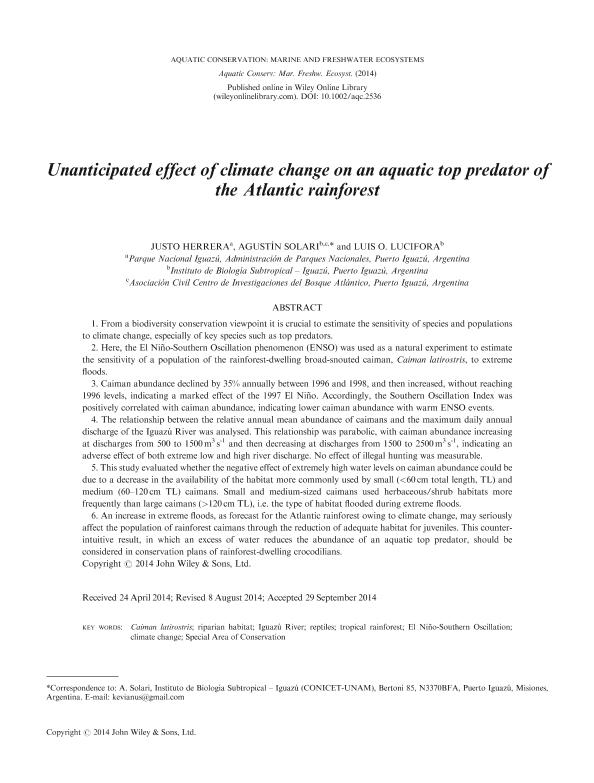Artículo
Unanticipated effect of climate change on an aquatic top predator of the Atlantic rainforest
Fecha de publicación:
01/12/2014
Editorial:
John Wiley & Sons Ltd
Revista:
Aquatic Conservation: Marine And Freshwater Ecosystems
ISSN:
1052-7613
e-ISSN:
1099-0755
Idioma:
Inglés
Tipo de recurso:
Artículo publicado
Clasificación temática:
Resumen
1. From a biodiversity conservation viewpoint it is crucial to estimate the sensitivity of species and populations to climate change, especially of key species such as top predators.
2. Here, the El Niño-Southern Oscillation phenomenon (ENSO) was used as a natural experiment to estimate the sensitivity of a population of the rainforest-dwelling broad-snouted caiman, Caiman latirostris, to extreme floods.
3. Caiman abundance declined by 35% annually between 1996 and 1998, and then increased, without reaching 1996 levels, indicating a marked effect of the 1997 El Niño. Accordingly, the Southern Oscillation Index was positively correlated with caiman abundance, indicating lower caiman abundance with warm ENSO events.
4. The relationship between the relative annual mean abundance of caimans and the maximum daily annual discharge of the Iguazú River was analysed. This relationship was parabolic, with caiman abundance increasing at discharges from 500 to 1500 m3 s-1 and then decreasing at discharges from 1500 to 2500 m3 s-1, indicating an adverse effect of both extreme low and high river discharge. No effect of illegal hunting was measurable.
5. This study evaluated whether the negative effect of extremely high water levels on caiman abundance could be due to a decrease in the availability of the habitat more commonly used by small (<60 cm total length, TL) and medium (60–120 cm TL) caimans. Small and medium-sized caimans used herbaceous/shrub habitats more frequently than large caimans (>120 cm TL), i.e. the type of habitat flooded during extreme floods.
6. An increase in extreme floods, as forecast for the Atlantic rainforest owing to climate change, may seriously affect the population of rainforest caimans through the reduction of adequate habitat for juveniles. This counter-intuitive result, in which an excess of water reduces the abundance of an aquatic top predator, should be considered in conservation plans of rainforest-dwelling crocodilians.
Archivos asociados
Licencia
Identificadores
Colecciones
Articulos(CCT - NORDESTE)
Articulos de CTRO.CIENTIFICO TECNOL.CONICET - NORDESTE
Articulos de CTRO.CIENTIFICO TECNOL.CONICET - NORDESTE
Citación
Herrera, Justo; Solari, Agustín; Lucifora, Luis Omar; Unanticipated effect of climate change on an aquatic top predator of the Atlantic rainforest; John Wiley & Sons Ltd; Aquatic Conservation: Marine And Freshwater Ecosystems; 25; 6; 1-12-2014; 817–828
Compartir
Altmétricas




